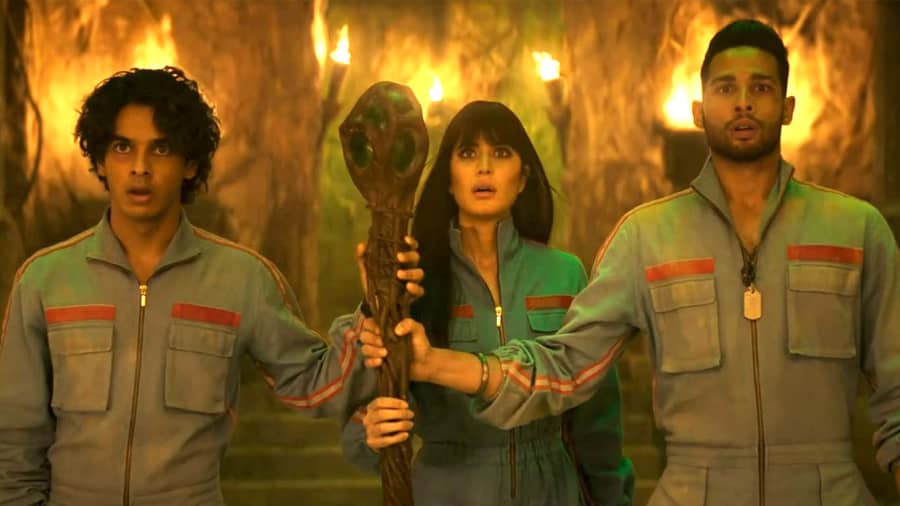Two good-for-nothing horror freaks, who can see and communicate with spirits, and who have had a series of failed enterprises, including a restaurant called ‘Rest in Pieces’.
A female ghost who befriends and coaxes them to start a ghost-catching business.
An evil tantrik-like figure, Atmaram Shastrashakti, who specialises in capturing disembodied souls and wants to corporatise his business. He and his lackeys, Rahu and Ketu, hit upon ‘ASSouls’ as its name (short for Atmaram Shastrashakti Souls Enterprises, but you get the drift from the way the name is pronounced).
A Bengali witch in white who is addressed as Vidhva (widow) by our heroes, but who is called Chikni Chudail. She speaks Hindi in the way Hindi filmmakers think Bengalis do (she cannot, for example, say ‘moksh’ and mispronounces it as ‘mok’). I am not sure, because by then I had tuned out, but I have not come across a Bengali yet who says ‘mok’ for moksh.
A daayan with an impossibly long plait, called Lady Diana (someone tell me I heard this wrong!), who breaks into a dance the moment she hears ‘Kali teri choti’ only because she is Punjabi (the filmmakers have been fair to all regions if not anything else – a Bengali witch, a Punjabi daayan, a Tamil protagonist).
Major (Siddhant Chaturvedi) and Gullu (Ishaan Khatter) are mad horror fans. Enter Ragini (Katrina Kaif), a ghost with an agenda of her own, who sets them on the path to establishing a business in catching ghosts (‘bhootbusters’, one of them exclaims). Their first exploit happens to be a young girl who floats midair till Gullu fishes out a photograph of Rajinikanth, and she is cured! And the rest are as asinine as this. Their adventures lead them to Atmaram (Jackie Shroff, in a badass avatar, giving the film its one passing funny moment when he breaks into tapori-speak, addressing Rahu and Ketu as ‘bhidu’). Now it is up to Major and Gullu to beat Atmaram and set all the dead souls free.
Director Gurmmeet Singh, with writers Jasvinder Bath and Ravi Shankaran Raj, try to conjure a film out of a series of puns and one-liners which might have elicited some laughter in a stand-up comedy show, but which are clearly not enough to string together a narrative. This is a classic case of an idea looking good on paper when you are in the right spirit (pun intended). I can see the filmmakers here, down by a peg or two, laughing at some of the lines, and thinking, “Wow, let’s make a film.”
Sample this: Major and Gullu promise to pay back every rupee their fathers have spent on them with “Sonu ‘Sood’ ke saath” (get that? sood, as in interest). Or this: after Major and Gullu snip off the Punjabi daayan’s long choti (braid), one of them sings: Dil hai chhota sa, chotio si aasha, while another goes: Bade bade shahron mein aisi choti choti baatein hoti hai. Or this: when the girl who is shushed by the Rajinikanth photo keeps sputtering, ‘Thalaiva, Thalaiva…’, Major goes, ‘Saliva, saliva.’
Since Jackie Shroff is playing the baddy, and this is a comedy, he gets to reference his debut, Hero, and even plays the flute refrain from the film. When Ragini proposes the idea of the business, suggesting that she will possess people and the two friends can then exorcise them, one of them says, ‘Virus bhi hum, antivirus bhi hum.’ Ho-hum.
If this is your idea of fun and comedy, you might just come out of Phone Bhoot slightly amused. If not, you can, like me, just tune out and let the banality wash over you till the end credits roll. As the only viewer in the first-day-first-show of the film in a theatre in Faridabad, I wandered around, much like Ragini, from one seat to another in a bid to get over the tedium. What can you say about a horror-comedy which has nary a scare and whose funniest line comes as a voiceover with the interval card? It is impossible to translate, but here goes: “If you have managed to hold your bowels and bladder till now, despite the comedy and the horror, it’s time to relieve yourself.” I rest my case.










